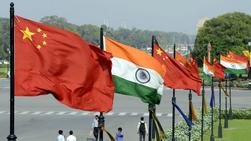 In this undated file photo, Indian and Chinese national flags flutter side by side at the Raisina hills in New Delhi, India. (PHOTO / XINHUA)
In this undated file photo, Indian and Chinese national flags flutter side by side at the Raisina hills in New Delhi, India. (PHOTO / XINHUA)
India's bans of nearly 180 Chinese-owned apps adds uncertainty to many people, including Chinese engaged in cross-border businesses, apart from affecting their routine operations and livelihoods.
"The way things are now, India is a difficult country for doing business," said Chen Xiaoming, a Chinese national who was in the real estate business in Gurgaon, northern India, and returned to China earlier this year.
After the Indian government's decision to ban 59 Chinese apps on June 28 it was wait and see for Chinese firms operating in India. The list of banned applications included TikTok, WeChat, Bigo Live, UC Browser, Xender, SHAREit, Helo, Likee, CamScanner, Vigo Video and Clash of Kings.
On Sept 3 India banned an additional 118 Chinese-owned apps, including the popular game app PUBG.
ALSO READ: India's new ban on 118 Chinese apps criticized
Despite reassurances from Indian neighbors, friends and colleagues, Chinese doing business in India are uneasy.
"We expect tension between the two countries to defuse sooner or later, but we'll be worried until it does," said another Chinese working in Gurgaon who asked not to be identified.
Another Chinese national working for a pharmaceuticals company in Haryana said there is serious doubt about whether top Indian leaders were given proper advice from professionals before the ban was imposed.
Some Chinese brands with manufacturing plants in India such as the smartphone market leader Xiaomi are making it a point of displaying "Made in India" on their products. Many of their operations have already integrated resources from both sides.
In June the Chinese handset maker Oppo canceled the livestream launch of its flagship 5G smartphone in the country.
A Chinese woman studying at the University of Delhi said she and her family are feeling the stress, but many Indian friends and her neighbors have been reassuring her not to be afraid.
Asked whether the ban will affect the relationship between the two countries on a larger scale, Swaran Singh of Jawaharlal Nehru University in New Delhi and chairman of the Centre for International Politics, Organization and Disarmament, said he does not think so, because he thinks it is largely a symbolic gesture.
READ MORE: Ban on apps adds uncertainty to Chinese businesses in India
There were domestic reasons for the Indian government's action against Chinese apps, he said.
Trade this year will shrink by US$10 billion, largely due to the coronavirus pandemic, Singh forecast. In the three years to 2019, trade between China and India was worth about US$90 billion. India's trade deficit with China last year was US$56.9 billion, the Indian embassy in Beijing said.
An economist working in the government sector who spoke on condition of anonymity said any potential technology war between the world's two most populous countries would hurt Chinese business interests and threaten tens of thousands of Indian jobs against the backdrop of a coronavirus-related slowdown.
The writer is a New Delhi-based journalist.


